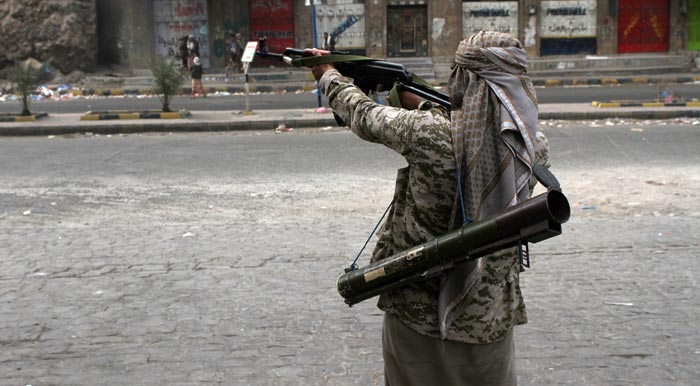A Yemeni tribal gunman of the Popular Resistance Committees loyal to fugitive President Abedrabbo Mansour Hadi raises his weapon in a street during clashes with Houthi rebels in Taez.
AFP/Sanaa
Clashes between rebels and pro-government forces in Yemen and Saudi-led air strikes killed 44 people, medics and local sources said on Sunday, as Riyadh pledged to cover a UN humanitarian aid appeal.
The UN says hundreds of people have died and thousands of families fled their homes since the air war was launched on March 26 at the request of embattled President Abedrabbo Mansour Hadi.
Ten Houthi rebels and four members of the "popular committees" militia fighting on the side of Hadi were killed in pre-dawn clashes in the southwestern city of Taez, the sources said.
The city has become the scene of fierce clashes over the past week, after having been largely spared in fighting that has spread across several Yemeni provinces.
Airstrikes on Houthi rebel positions in the southern city of Daleh as well as clashes on Sunday killed 17 Houthis and six southern fighters.
Seven more Houthis were killed in an attack by tribesmen in the southern Shabwa province.
The rebels who seized Sanaa unopposed in September, have since expanded their control over several provinces.
In Aden, southern fighters clashed on Saturday night with rebels and allied troops who have seized parts of the city, residents said, but no casualty toll was available.
Saudi King Salman ordered the aid pledge following a UN appeal on Friday for $274mn in emergency assistance for the millions affected by Yemen's multi-sided conflict.
The kingdom "stands with its Yemeni brothers" and hopes for "the restoration of security and stability", the state Saudi Press Agency said.
UN Humanitarian Coordinator Johannes Van Der Klaauw said Friday that "ordinary families are struggling to access healthcare, water, food and fuel - basic requirements for their survival".
Aid trickles in
Aid has only trickled into Yemen, largely because of Saudi-led coalition restrictions on its airspace and ports.
On Friday, the coalition spokesman said two cargos of supplies donated by Qatar and the United Arab Emirates had reached Aden and the Red Sea city of Hodeida, via Djibouti, across the narrow Bab al-Mandab Strait.
Brigadier General Ahmed al-Assiri told reporters in Riyadh that "other cargos will follow in the coming days" in a "sea bridge to get aid to the Yemeni people."
But he insisted that shipments must be coordinated with the coalition.
Aid group Doctors Without Borders separately said that "more than 70 tonnes of medical material" arrived by plane in Sanaa on Saturday.
Assiri said a Saudi soldier was killed on Friday in fighting in the southwestern Saudi region of Najran, along the Yemeni border.
The spokesman added the coalition had launched more than 2,000 air strikes on Yemen since the air campaign began.
Bombing campaign
The bombing campaign was launched amid Saudi fears the Houthis would shift Yemen into the orbit of Iran.
On Friday, Tehran submitted a four-point Yemen peace plan to UN chief Ban Ki-moon.
It calls for a ceasefire and immediate end to all foreign military attacks, the urgent delivery of humanitarian and medical aid, a resumption of political talks and the formation of a national unity government.
Al-Qaeda has taken advantage of the air war on the Houthis to expand its influence in Yemen, overrunning Friday an army camp in the southern province of Hadramawt, a day after seizing the airport in provincial capital Mukalla.
A US drone killed on Saturday night three Al-Qaeda suspects as it struck a vehicle in Saeed, in Shabwa province, a tribal chief said.

